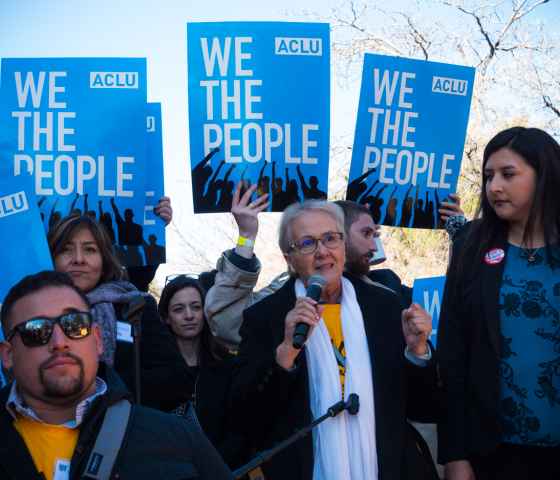FOR IMMEDIATE RELEASE Tuesday, February 13, 2007
CONTACT: Whitney Potter (505) 266 5915 ext. 1003 Cell (505) 507 9898; or James Scarantino (505) 366-7873
Albuquerque—A federal judge struck down Albuquerque’s Voter ID law yesterday “because it imposes a significant burden on the fundamental right to vote, and because that burden is not narrowly tailored to meet the City’s interest in preventing voter impersonation at the polls.” The ruling results from a lawsuit that the American Civil Liberties Union (ACLU) of New Mexico filed in October, 2005 on behalf of the League of Woman Voters and Bernalillo County, Inc., among other plaintiffs.
“The law created an unfair, unequal system of voting,” said ACLU Executive Director, Peter Simonson. “It treated people who voted in person as suspicious, but exempted people who voted absentee from any ID requirements at all. Ironically, it gave a pass to the very type of vote that is most susceptible to fraud.”
In her ruling, Judge Christina Armijo noted that the City of Albuquerque failed to present “evidence of voter fraud or voting irregularities among Albuquerque voters who vote in person at their precinct polling place on election day.” Indeed, the most convincing evidence of voter fraud lay with absentee voting. Testimony by former NM State Election Director Denise Lamb “cite[d] several examples of schemes or ploys that reportedly were used to defraud or disenfranchise voters using absentee voting procedures.”
ACLU attorney James Scarantino said, “The judge underscored the truly cynical nature of this law. The people of Albuquerque were sold voter ID as a preventive measure for voter impersonation, when in fact the law fixed what didn’t need fixing. And it left the only real source of fraud—absentee voting--unchecked.”
Scarantino noted that the Albuquerque City Council was warned in June 2005 by City Councilor Michael Cadigan that the disparate treatment of in-person and absentee voters would prove to be unconstitutional.
“They should not have blocked Cadigan’s efforts to plug the loop-hole for absentee voters,” Scarantino said.
ACLU Director Simonson said, “With this decision I think we’ve started a trend in which the courts are looking with much greater skepticism on laws that impose burdensome ID requirements on voters. Hopefully our state legislators will take this into account in the next several weeks as they consider bills proposing new voter ID requirements.”
The ACLU recognized Scarantino in 2006 as its “Cooperating Attorney of the Year” for his outstanding work on the voter ID lawsuit.
###
